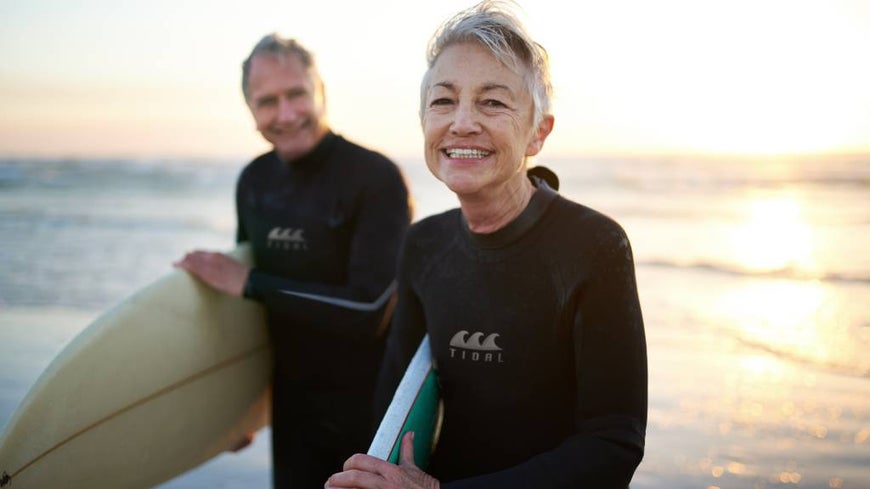11 ways to reset your immunity clock

Written by Rachel Smith for Australian Seniors.
How can you improve your immune system, and why is this essential for good health as an older Australian? Our immune systems are very important – they do a great job of defending us against disease-causing microorganisms. However, they can also fail from time to time. When a virus or germ enters your body, it can make you sick – and as we age, recovery times can be longer. This is where your immune system comes in. Here are some ways to potentially strengthen it, the natural way.
#1: Chew your food (really well)
In the habit of bolting down your dinner every night? Learn to take your time, says accredited practising dietitian and nutritionist Zoe Wilson. “Chewing your food well can have many positive benefits, and research suggests it helps with gut health, which is linked to immunity.”
#2: Make sure you’re fully vaccinated
The COVID-19 vaccine is especially important for older Australians, says Nobel laureate and immunologist Professor Peter Doherty, patron of the Doherty Institute. “Plus, most people who are double-vaccinated, catch COVID and end up in hospital, will only be there a short time and won’t end up in ICU. So get vaccinated and if you’re offered the booster, take that too,” he explains.
#3: Take cold showers

The shock of cold water could reduce how often you get the sniffles. In one study, researchers found that people who took very cold showers for at least 30 seconds for a month were 29% less likely to call in sick to work. Apparently, that short burst of cold water triggers the body’s immune system, says Dr Jenna Macciochi, an immunology expert and the author of Immunity: The Science of Staying Well. “At the end of every shower, turn the temperature to the coldest setting for 20 or 30 seconds,” she suggests.
#4: Avoid processed foods
“Swapping to less processed foods and a variety of fresh foods helps to support the immune system – as will eating enough nutrients, which is required for the health and function of all cells, including immune cells,” says Zoe.
#5: Consider vitamin D
“There is some suggestion that taking Vitamin D3 will help if you’re not getting enough sunlight,” says Professor Doherty. An estimated 23% of Australians are Vitamin D-deficient, and scientists are looking into the role Vitamin D plays in our immune responses.
#6: Look after your gut health
“The gut is a major site of immune activity and the production of antimicrobial proteins, which help to fight bugs before they can get on top of us,” says Zoe. “So, improving your gut health means boosting your intake of fruit and vegetables, protein, wholegrains and dairy.”
#7: Don’t skimp on sleep
Sleep science has come ahead in leaps and bounds in recent years, with researchers finding solid links between strong immunity and enough shut-eye. “Sleep is the bedrock of your immune system, and if you don’t sleep properly, other immune protecting behaviours during the day like eating well and exercising won’t really count,” says Dr Macciochi. Snoring can be a sign that your quality of sleep is not optimal.
#8: Munch on mushrooms

It’s worth including mushrooms regularly in your diet, says Zoe. “Although the research is still a little limited, mushrooms have been used as part of Asian medicine to help boost immunity and they’re power-packed with a wide range of vitamins and minerals.”
#9: Get moving
Countless studies suggest that regular exercise, especially in your later years, can result in the immunity of a much younger person. One King’s College London study found that long-distance cyclists – some in their 80s – had the immune systems of 20-year-olds. “Exercise that helps you avoid muscle loss is key, especially as you get older,” says Professor Doherty. “Swimming is great for this.”
#10: Eat more protein

This is especially important if you’re older, say experts – which can be a time when micronutrient deficiencies pop up. “If you do become nutritionally deficient, this may worsen declining immune function,” explains Zoe. “So eating adequate amounts of protein and the amino acids they provide is key.”
#11: Phone a friend or two
Maintaining friendships might be something that’s easy to let slip as we get older, but research shows socialising plays a key role in keeping us well, says Dr Macciochi. “When we feel lonely, however, our immune systems go on high alert and an inflammatory response takes place,” she explains.
21 Mar 2022